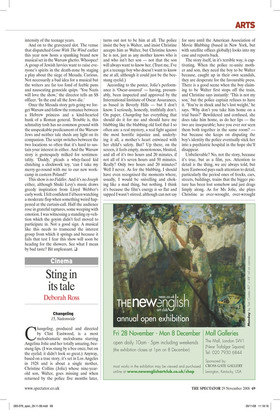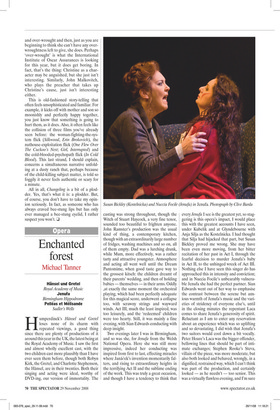Sting in its tale
Deborah Ross
Changeling 15, Nationwide Changeling, produced and directed by Clint Eastwood, is a most melodramatic melodrama starring Angelina Jolie and her totally amazing, beestung lips. (I was stung by a bee once, but on the eyelid; it didn’t look so great.) Anyway, based on a true story, it’s set in Los Angeles in 1928 and is about a single mother, Christine Collins (Jolie) whose nine-yearold son, Walter, goes missing and when returned by the police five months later, turns out not to be him at all. The police insist the boy is Walter, and insist Christine accepts him as Walter, but Christine knows he is not, just as any mother knows who is and who isn’t her son — not that the son will always want to know her. (Trust me, I’ve got a teenage boy who doesn’t want to know me at all, although it could just be the beestung eyelid.) According to the poster, Jolie’s performance is ‘Oscar-assured’ — having, presumably, been inspected and approved by the International Institute of Oscar Assurances, as based in Beverly Hills — but I don’t know. I seriously, honestly, truthfully don’t. On paper, Changeling has everything that should do it for me and should have me blubbing like the blubbing old fool that I so often am: a real mystery, a real fight against the most horrific injustice and, underlying it all, a mother’s heart entwined with her child’s safety. But? Up there, on the screen, it feels empty, monotonous, bloated, and all of it’s two hours and 20 minutes, if not all of it’s seven hours and 50 minutes. Really? Only two hours and 20 minutes? Well I never. As for the blubbing, I should have even recognised the moments where, usually, I would be snivelling and choking like a mad thing, but nothing. I think it’s because the film’s energy is so flat and sapped I wasn’t stirred, although can not say for sure until the American Association of Movie Blubbing (based in New York, but with satellite offices globally) looks into my case and reports back.
The story itself, in it’s terrible way, is captivating. When the police re-unite mother and son, they need the boy to be Walter because, caught up in their own scandals, they are desperate for the favourable press. There is a good scene when the boy claiming to be Walter first stops off the train, and Christine says instantly: ‘This is not my son,’ but the police captain refuses to have it. ‘You’re in shock and he’s lost weight,’ he says. ‘Why don’t you take him home on a trial basis?’ Bewildered and confused, she does take him home, as do her lips — the two are inseparable; have you ever not seen them both together in the same room? — but because she keeps on disputing the boy’s identity the police eventually stick her into a psychiatric hospital in the hope she’ll disappear.
Unbelievable? No, not the story, because it’s true, but as a film, yes. Attention to detail is the thing, we are always told, but here Eastwood pays such attention to detail, particularly the period ones of frocks, cars, streets, buildings, trains that the bigger picture has been lost somehow and just drags limply along. As for Ms Jolie, she plays
12:45 a 1
Christine as over-wrought, over-wrought and over-wrought and then, just as you are beginning to think she can’t have any overwroughtness left to give, she does. Perhaps ‘over-wrought’ is what the International Institute of Oscar Assurances is looking for this year, but it does get boring. In fact, that’s the thing: Christine as a character may be anguished, but she just isn’t interesting. Similarly, John Malkovitch, who plays the preacher that takes up Christine’s cause, just isn’t interesting either.
This is old-fashioned story-telling that often feels unsophisticated and familiar. For example, it kicks off with mother and son so moonishly and perfectly happy together, you just know that something is going to hurt them, as it does. Also, it often feels like the collision of three films you’ve already seen before: the woman-fighting-the-system flick (Silkwood, Erin Brokovich), the nuthouse-exploitation flick (One Flew Over The Cuckoo’s Nest; Girl, Interrupted) and the cold-blooded-psychopath flick (In Cold Blood). This last strand, I should explain, concerns a simultaneous narrative unfolding at a dusty ranch that, perhaps because of the child-killing subject matter, is told so foggily it never feels authentic or scary for a minute.
All in all, Changeling is a bit of a plodder. Yes, that’s what it is: a plodder. But, of course, you don’t have to take my opinion seriously. In fact, as someone who has always craved bee-stung lips but has only ever managed a bee-stung eyelid, I rather suspect you won’t. ❑



































































































 Previous page
Previous page